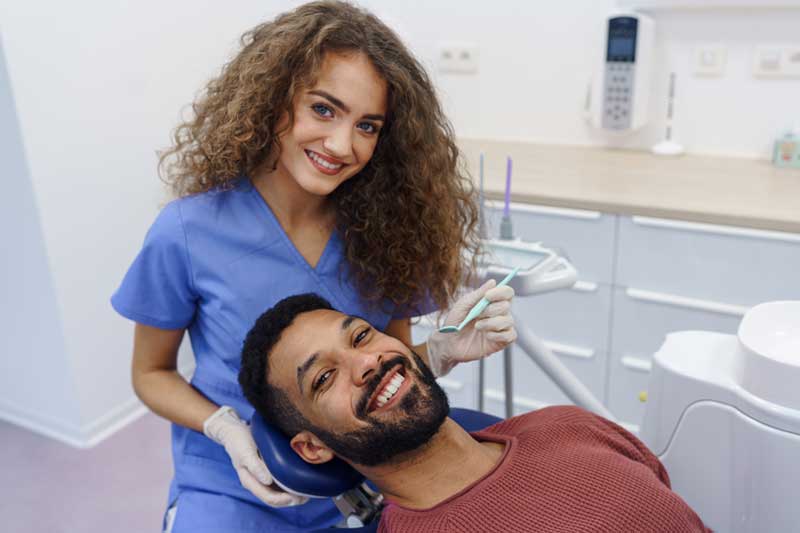
Relax During Your Dental Visit
It’s common to feel nervous about dental visits — many children and adults struggle through their appointments due to pain or fear. Many people find even their regular dental cleanings uncomfortable, not to mention other procedures.
Patients who suffer from dental anxiety find it nearly impossible to attend their dental appointments due to these overwhelming feelings. This can be incredibly problematic as dental visits not only help keep your mouth free of decay but also serves as a time for us to check for more serious problems like oral cancers and periodontal disease.
At State Street Smiles, we want you to feel comfortable when you come to our Hackensack, NJ office. Dr. Jackson is happy to offer sedation dentistry to New Jersey patients from the Teterboro, Maywood, Teaneck, and surrounding areas. Dental appointments are crucial to your overall wellness and are designed to improve your oral health. If fear and anxiety are keeping you from that, we’re here to help. We provide several dental sedation options in our office with the help of a professional anesthesiologist.

What is sedation dentistry?
Sedation dentistry is the use of medication to relax patients during dental procedures. While sedation may imply that you’ll be asleep, you’ll generally be conscious unless you’re under general anesthesia. Sedation dentistry helps many patients relax during their appointments and makes your procedure go by quicker without pain, anxiety, and fear. Depending on your procedure and your medical history, we may use different levels of sedation.
You won’t feel pain or anxiety during your procedure due to sedation, so you can relax. Most patients don’t remember their procedure, even with lower levels of sedation. You may feel a little drowsy after your procedure, so you’ll need to make sure someone else you can trust can drive you home.

Nitrous Oxide (Laughing Gas)
This low-level sedation can be used for most types of dental visits. Though it’s often referred to as laughing gas, it won’t actually make you laugh. You’ll simply feel very relaxed, your pain will be eased, and your appointment will pass by more quickly.
Nitrous oxide can be used for both adults and children safely, with no side effects. Our fully qualified anesthesiologist will monitor you throughout the appointment and make sure you or your child is completely safe during the procedure.

IV Sedation
For a stronger sedation option, we can use intravenous (IV) sedation. Our board-certified anesthesiologist will monitor you throughout the appointment to make sure you’re safe while your dentist focuses on performing the procedure.
You won’t feel any pain and you likely won’t remember the procedure at all. If you’re going to have IV sedation, you’ll need to make sure and bring someone else with you who can drive you home because you’ll feel drowsy afterward.

General Anesthesia (Hospital Sedation)
If you or your child requires more sedation, we can bring you into the hospital for the procedure so a specially-trained anesthesiologist can monitor the anesthesia levels so he can focus on delivering high-quality dental care.
Frequently Asked Questions
Yes, low-level sedation is safe for children and toddlers with the oversight of a professional. At our office, we have a professional anesthesiologist who administers sedation so our dentists can solely focus on their dental work.
The anesthesiologist will monitor your child closely to ensure that they’re safe throughout the entire procedure. There are no side effects of sedation on toddlers after the procedure.
Yes, sedation dentistry helps many patients relax during their appointments and makes your procedure go by quicker without pain. Depending on your procedure and your medical history, we may use different levels of sedation.
You won’t feel pain or anxiety during your procedure due to sedation, so you can relax. Most people don’t remember their procedure, even with lower levels of sedation. You may feel a little drowsy after your procedure, so you’ll need to make sure someone else can drive you home.
Sedation dentistry is the use of medication to relax patients during dental procedures. While sedation may imply that you’ll be asleep, you’ll generally be conscious unless you’re under general anesthesia.
Though you’ll probably be awake, you’ll feel extremely relaxed and not as aware of your surroundings. Because of this, you likely won’t remember much of the procedure and you won’t feel pain.
Can you eat before sedation dentistry?
Your pre-procedure requirements for sedation depend on the level and type of sedation you’ll be receiving.
- Nitrous Oxide: Though this is the mildest form of sedation, you may feel nauseous if you eat a few hours before your procedure. After your procedure is done, there are no dietary restrictions.
- Oral Conscious Sedation: You’ll likely be instructed to avoid eating anything for six hours before your procedure unless your dentist tells you otherwise. After your procedure, make sure to stay hydrated by drinking plenty of water.
- IV Sedation: This type of sedation must be done on an empty stomach, so make sure you don’t eat anything for six hours before your procedure.
- General Anesthesia: Like IV sedation, you won’t be able to eat for at least six hours before the procedure.
Your dentist will provide you with detailed instructions on how to prepare for your dental procedure.



